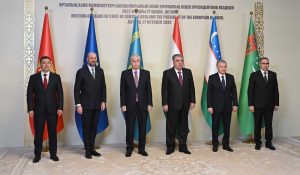When European Council President Charles Michel delivered remarks after meeting with Kazakh President Kassym-Jomart Tokayev on October 27, Ukraine was clearly on his mind. Michel said as much, noting that his visit “takes place at a difficult time for Europe and for the wider region.”
While in Astana, Michel met with the other presidents of the Central Asian countries in the first EU-Central Asian leaders’ meeting. The format has become increasingly popular, with Russia holding its first such minilateral just two weeks before Michel came calling on behalf of Europe.
Central Asia straddles the geopolitical space between Russia and Europe. Moscow’s revisionist view of the former Soviet Union worries Central Asia, but Russia’s economic, political, and cultural importance across the region makes a clear break all but impossible to imagine.
This is illustrated, for example, in the U.N. votes cast (or not) by the states of Central Asia on resolutions directed at Russia. In the October 12 vote condemning Russia’s “illegal so-called referendums” and annexations in Ukraine, the five Central Asian states were among the countries to abstain (or, in Turkmenistan’s case just avoid voting at all). For many regional analysts, taking Central Asia’s unique context into account, those abstentions ought to be interpreted as condemnations.
At the same time, Central Asia remains closer — politically and stylistically — to Russia than Europe, though you wouldn’t know that from Michel’s remarks.
After his meeting with Tokayev, who is most assuredly going to be re-elected in the snap presidential election set for November 20 given the absolute lack of serious political opposition in the country, Michel said he’d discussed “the ambitious reforms of the Kazakhstan government.” He continued, beating a familiar drum: “The EU supports reforms aimed at bolstering democracy. Respect for human rights and fundamental freedoms is an essential element of our cooperation.”
The joint communiqué following the EU-Central Asian leaders’ meeting said that the gathered leaders “reaffirmed their commitment to work together for peace, security, democracy, rule of law and sustainable development in full respect for international law.”
Ironically, RFE/RL had this to report:
As Michel spoke about democratic freedoms, a police officer entered RFE/RL’s office in Astana on October 27 and demanded the deletion of a video taken by an RFE/RL cameraman of a convoy of vehicles leaving the president’s office during a visit by European Council President Charles Michel.
When RFE/RL journalists at the office refused to delete the video, saying they are accredited reporters and have the right to film events in the country, the officer spoke by phone with his supervisors and warned as he was leaving that a group of officers would return. No further police showed up.
And the following day, Kyrgyzstan’s independent media outlets staged a protest in solidarity with the blocking of RFE/RL’s Kyrgyz Service by Bishkek. Meanwhile, more than 20 opposition politicians, activists, and at least one journalist are sitting in pre-trial detention following mass arrests just days before Michel arrived in the region. The detained are accused of plotting mass riots over a pending border agreement with Uzbekistan.
In concluding his remarks after meeting with Tokayev, Michel got to the real point: “President Tokayev, your country is a bridge between Europe and Asia, and Central Asia is an increasingly important region in its own right. The more your countries cooperate, the stronger the region will be. Recent global events have brought the EU and Central Asia closer to each other. Our close cooperation is even more important now than ever.”
Sprinkled references to democracy and human rights are routine for European leaders, but a lack of progress on those fronts is not a serious concern for Europe, especially now. Russian military aggression is. Europe would win no friends in Astana if it came with overly critical remarks about Kazakhstan’s internal politics, or those of any other Central Asian state.
It’s perhaps worth noting that the joint communiqué after the EU-Central Asia Leaders’ Meeting did not mention Ukraine directly and neither did the Kremlin readout of Putin’s October 14 summit with the Central Asian presidents. It’s hard to believe that Ukraine was not discussed; it’s easier to accept that Ukraine was indeed discussed, with the price being respect — from both the EU and Russia — of Central Asia’s desire for neutrality on the matter.

































